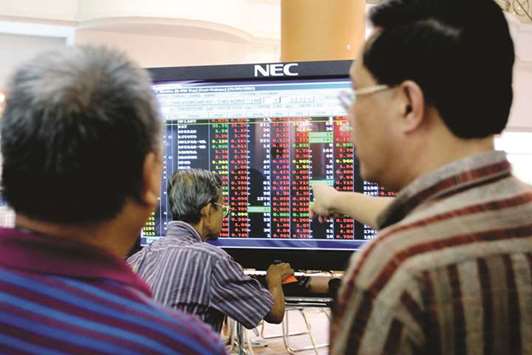The growing popularity of Islamic finance has led to the constant development of new Shariah-compliant investment products that are modelled after conventional finance structures but are fully adhering to Islamic principles. Most of those products have been developed and popularised in Malaysia, the world’s largest Islamic finance market and also the most innovative.
Among them is a relatively new class of Islamic investment vehicles, namely Islamic Exchange Traded Funds, or Islamic ETFs. Most investors are familiar with conventional ETFs, open-ended, passively managed index-tracking funds consisting of a group of stocks that can be listed and traded on a stock exchange like a single stock. ETFs have become increasingly popular among both institutional and retail investors globally in recent years due to their low management costs, high liquidity, relative safety and solid appreciation potential as a mid- to long-term investment.
According to Bloomberg, the global ETF market is currently worth more than $4tn.
This makes certainly a case for Islamic ETFs. While Islamic and conventional ETFs share common characteristics, their main difference is that Islamic ETFs track only benchmark indices that consist of Shariah-compliant stocks or assets. The first such Islamic ETF came up in Turkey in 2006 when the Dow Jones Islamic Market (DJIM) Turkey ETF was listed on the Istanbul Stock Exchange to track the performance of the DJIM Turkey Index. In Malaysia, an Islamic ETF was launched in 2008, tracking the DJIM Malaysia Titans 25 Index as a benchmark index.
Meanwhile, Malaysia has four Islamic ETFs listed on the stock exchange in Kuala Lumpur – including the first ever Shariah compliant gold ETF – and is the world leader in Islamic ETFs through issuer i-VCAP, a unit of Valuecap, which is an asset management firm owned by state investment holding Khazanah Nasional.
Other Islamic ETFs have been mainly listed on the stock exchanges in New York and London. One of the largest ETF issuers globally, iShares, a unit of US asset management giant BlackRock, also has Islamic ETFs in its portfolio, as does Deutsche Bank’s db-X trackers, listed in Luxembourg and London, making it easy for investors to access this market.
And there is significant potential for growth. Studies have found that Islamic ETFs are able to beat conventional ETFs by their inherent risk-adjusted performance measures, and they also show less variability and are therefore less risky than conventional ETF portfolios. However, the total volume of Islamic ETFs currently stands at $300mn, just about 0.0075% of the global ETF market size, probably because setting up an Islamic ETF is to some extent more complex than launching a conventional ETF.
An Islamic ETF is managed strictly under Shariah principles and overseen by an appointed Shariah committee, which conducts regular reviews and audits on the Islamic ETF to ensure strict compliance with Shariah practices, which naturally increases costs and results in higher fees compared to conventional ETFs.
This means, to tap the huge potential, Islamic ETFs need to be made cost-effective and also get incentivised by governments to attract both institutional and retail investors. Institutional investors, for example, could be motivated by tax advantages to shift a portion of their investment portfolio towards Islamic ETFs, and retail investors would find a competitive flat-fee package worthwhile in order to buy into Shariah-compliant ETFs.
In this regard, Malaysia is leading the innovation efforts in the Islamic ETF market. Most recently, the Malaysian Securities Commission issued Shariah guidelines on Islamic ETFs based on gold and silver, launched a new Islamic fund and wealth management blueprint that includes regulations for Islamic ETFs, as well as created a taskforce to figure out how minimum capital requirement for ETF issuers can be lowered and their distribution channels can be expanded.
Furthermore, more sophisticated Islamic ETF structures are being developed by Malaysia’s Islamic financial engineers, including leveraged and futures-based ETFs.
As it stands, most of the current demand for Islamic ETFs comes from Malaysia, Europe and the US, but less so from Gulf Cooperation Council (GCC) countries where the concept of ETFs is relatively new. The first (conventional) foreign exchange-traded fund was listed on the Dubai Financial Market only in June 2016. In March 2017, the Dubai Financial Market launched a trading platform for ETFs, the first of its kind in the GCC, to attract more investors to the new asset class and to improve liquidity levels.
Bahrain last year introduced new directives for both conventional and Shariah-compliant ETFs in a bid to build up the asset class in the country. But only three regional Shariah-complaint ETFs are currently listed in the GCC, two issued by Saudi investment firm Falcom Financial Services on the Tadawul exchange, and another by the National Bank of Abu Dhabi.
Experts say that the rarity of home-grown ETFs in the GCC has to do with the fact that brokers and investment companies do not have much interest in meagre fees they would earn from passively managed EFTs and rather focus on other, more sophisticated investment products with higher returns for them. Gulf investors are also more into short-term trading on the exchanges and prefer sukuk or commodity funds for long-term investment. That said, the GCC certainly needs more promotion to bring Islamic ETFs out of their niche and to educate investors about the value and diversification potential of such low-cost, passive investment products.

A trader points to the electronic screen at the close of trading at the Kuala Lumpur Stock Exchange (file). Malaysia has four Islamic ETFs listed on the stock exchange in Kuala Lumpur, including the first ever Shariah compliant gold ETF.


